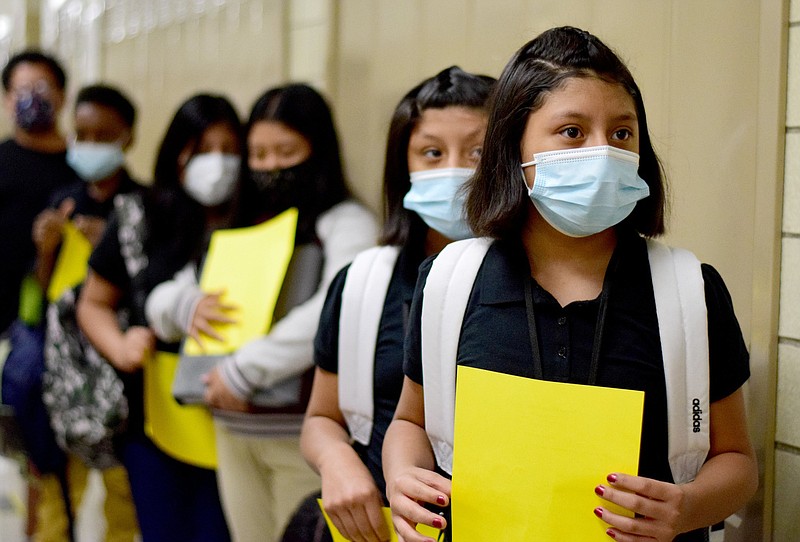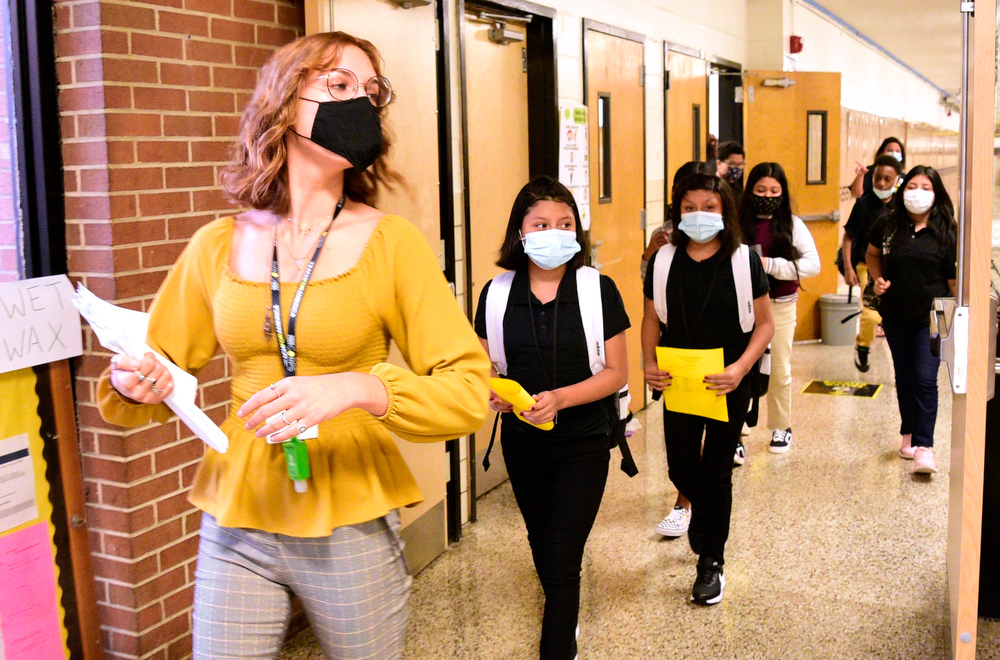When Hamilton County Schools returned to the classroom Thursday, nearly all the students at Orchard Knob Middle were wearing face masks to prevent the spread of COVID-19.
Eighteen miles north, at Soddy Daisy High School, roughly half the students went without the protective measure deemed necessary by leading medical organizations.
Starting Monday, Hamilton County Schools will require students to wear face coverings indoors - while allowing parents to opt them out. The dual approach was the district's answer to try and curtail the spread of COVID-19 in the face of the highly contagious delta variant while giving parents freedom to choose.
The opt-out concept represents a variation from typical public health efforts, which require some level of individual sacrifice for the purpose of protecting the health of the community.
Peter Jones, an assistant professor in the Department of Political Science and Public Administration at the University of Alabama at Birmingham, said that the district's decision to require masks but allow a parental opt-out reflects schools trying to address a health and political crisis that they never wanted.
"School districts are in a no-win situation where they're going to upset somebody, and it creates within itself a lot of other issues," Jones said, adding that Hamilton County Schools' mask policy is "almost an impossible policy to implement" because of the administrative burden it places on teachers and staff.
"This is the start of a school year after a whole year of learning loss, expanding gaps in achievement ... You already had a lot of things that school districts, administrators and teachers were going to have to deal with, and then you're throwing a fourth wave of a very transmissible virus at them," Jones said.
Hamilton County Schools officials did not respond to questions about how they plan to enforce the new requirement or track which students have opted out, but spokesperson Cody Patterson said in an emailed statement, "We believe in the mitigation strategies that helped us maintain 90% in-person instruction last year."
A mask requirement was in place for Hamilton County Schools throughout the 2020-21 academic year, and there was no opt-out available for parents.
Dr. William Schaffner, medical director of the National Foundation for Infectious Diseases, said the district's new policy "sounds like a recommendation rather than an obligation or a mandate," but the extra hurdle of making parents complete an online form could boost compliance over leaving the decision to wear masks up to students themselves.
"I'm not locked in a box here unaware that this is a highly controversial issue, and I think that the more that a school board can do, the better it is," Schaffner said. "You have to do what you can locally, but it's clear that from a public health point of view, masking is the best and most secure recommendation."
The district's reopening plan for the 2021-22 school year states its "vaccination rates are what allow us to operate schools without the same level of stringent mitigation measures as we employed during last school year."
Nearly 72% of teachers and around 68% of all staff are fully vaccinated or have received at least one dose of COVID-19 vaccine, the district says. State estimates show 30%-40% of residents between age 12 and 20 are vaccinated, according to the school reopening plan.
Scientists originally estimated a vaccination rate of around 70% was needed to safely resume in-person activities without mitigation measures, but Dr. Preeti Malani, the chief health officer and a professor of medicine in the Division of Infectious Diseases at the University of Michigan, said those benchmarks need to be much higher now due to the delta variant.
"Schools cannot be safer than the community," Malani said. "When COVID in the community is widespread, people in the classroom are also going to have exposure to COVID. And if you get exposed and you're not vaccinated, you have to be quarantined. If every day you're trying to figure out who got exposed and contact trace, that's a lot of effort, and it's very hard to focus on the core mission of teaching."
Schools can also help fuel community spread to the point it overwhelms health systems, Malani said, which is already happening in hospitals across Tennessee.
As of Saturday, the district's COVID-19 reporting dashboard showed 148 active student cases and 381 active student close contacts. For employees, the district reported eight close contacts and 45 active cases.
Schaffner said that masks are one of many layers of mitigation measures that schools need in place given children younger than 12 are not yet eligible for vaccination, and vaccination rates among those who are eligible remain low.
"You need to do a whole series of things, and you need to do them consistently," Schaffner said, comparing the layered approach to COVID-19 mitigation - vaccines, face masks, social distancing, sanitation measures, improved ventilation - to pieces of Swiss cheese stacked on top of each other.
"We use a series of barriers, each one making a contribution, that help cover up the limitations of the other barriers," he said. "If a substantial number of parents have their children opt out for masking, that increases the holes in that slice of Swiss cheese - it reduces the effects of that protective measure."
On Friday, schools spokesperson Patterson said he did not yet know how many parental opt-out forms - which became available online Thursday - had been completed so far. Parents are able to opt out of the mask requirement at any time, according to the district's reopening plan.
Resistance to face masks and other public health interventions have hindered America's ability to control the coronavirus since the early days of the pandemic. As a result, many state and local governments have decided to implement face mask mandates at various points in order to boost compliance among those who otherwise wouldn't follow the public health recommendations on their own accord.
Tennessee Gov. Bill Lee never implemented a statewide mask mandate and instead delegated that power to local leaders until April, when he revoked the authority to impose mask mandates in 89 counties whose health departments he controls. Hamilton County, which is one of six metro areas that operate independently, allowed its mask mandate to also expire in April.
Tennessee law still grants school boards the authority to mandate face masks, something that Lee and Education Commissioner Penny Schwinn have made clear.
Hamilton County Schools kept its mask requirement in place throughout the 2020-21 academic year, and as summer saw COVID-19 cases in the county drop to a weekly average of nine new cases per day in late June, district officials maintained they would strongly recommend but not require masks in the new school year.
The highly contagious delta variant changed those plans. New COVID-19 cases in Hamilton County have surged to a weekly average of 223 per day as of Friday, according to data from the Hamilton County Health Department.
Over the past 14 days, Hamilton County schoolchildren ages 5-18 accounted for 431 new COVID-19 cases - behind only Shelby (1,545) and Davidson (560) counties for the most cases reported in a county during that period, according to data from the Tennessee Department of Health.
Dr. Malani said "it seemed like we were going into the fall in really good shape" based on the pandemic's trajectory in late spring and early summer, but COVID-19 levels are far too high and vaccination rates are far too low to send kids to school without masks.
"It's going to be difficult just because of the concern around the delta variant. It's so much more infectious," Malani said. "Last year was one thing. This year will be a very different thing [due to delta], and this is a situation where students are not eligible for vaccination yet. So, you have a population that's completely susceptible, but you have an intervention that doesn't cost money, that is safe, that works."
Both the U.S. Centers for Disease Control and Prevention and American Academy of Pediatrics in July issued updated COVID-19 guidance for schools, which called for universal indoor masking of staff and students over the age of 2 regardless of vaccination status. Those guidelines emphasize the importance of in-person learning and masks as a tool to not only protect health but keep schools open.
"Getting kids back to the classroom is not optional, it's essential," Malani said. "We'll find that the school districts, whether it's in Tennessee or another state, where mask mandates are followed will be the places that don't have disruptions."
The new guidelines bolstered arguments from health advocacy groups calling for stricter mitigation measures as schools prepared to return in the fall, and a growing number of school districts in the state have decided to implement some form of face mask requirement for the new year, though they vary in scope and exemptions allowed.
(READ MORE: With days to go, Hamilton County parents urge mask mandate in schools)
The return of school mask mandates in Tennessee has drawn criticism from some GOP lawmakers and in some cases strong parental opposition.
Jones said one of the common arguments he hears against face masks in school is that children learn better without them, but there's no evidence that students wearing masks creates learning loss or negative psychological effects.
"The alternative is that we could potentially see a vast spread and a bunch of kids in quarantine, and I think that's something that's been lost in the debate," Jones said. "We have evidence that missing school and being out of the classroom is bad for kids."
Malani said she understands that mask mandates and COVID-19 mitigations measures can be difficult and exhausting.
"But as the pandemic changes, the recommendations and approach needs to change," she said. "Starting with masks in August and September doesn't necessarily mean we need masks in October. I would love to see the day when we can have the children safely in class without masks, but we're not there yet."
Contact Elizabeth Fite at efite@timesfreepress.com or 615-757-6673. Follow her on Twitter @ecfite.

